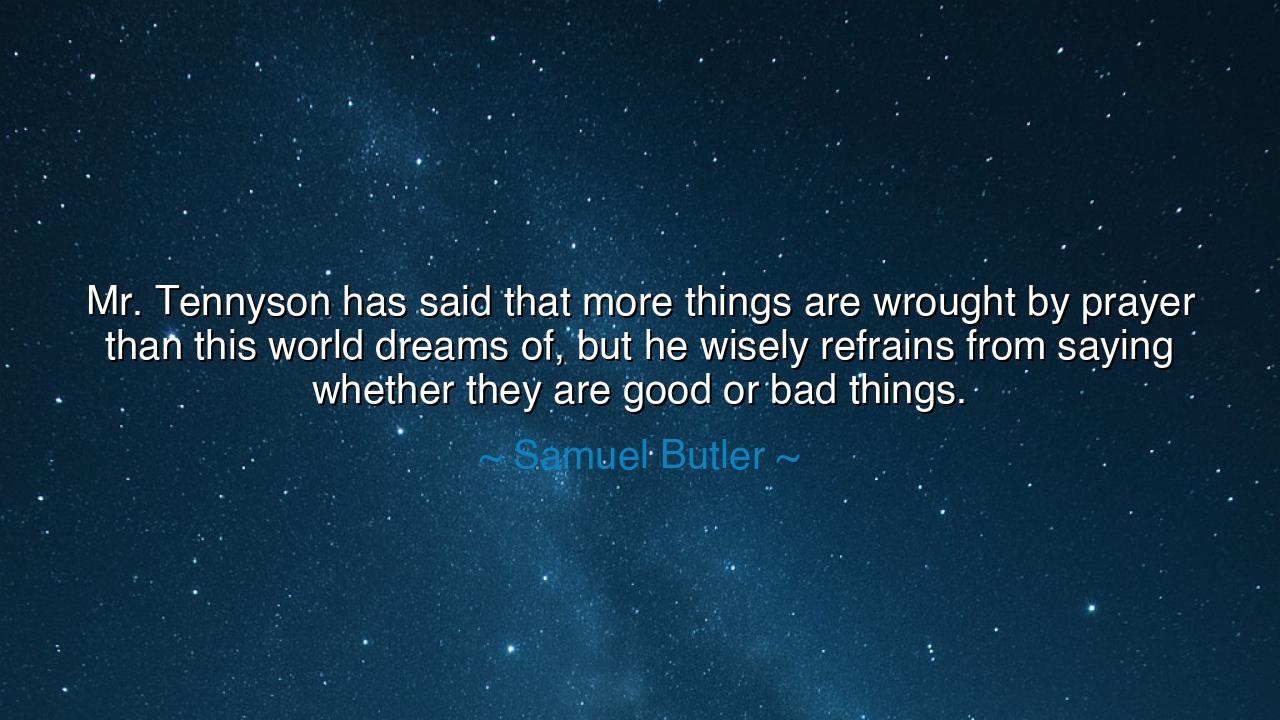
Mr. Tennyson has said that more things are wrought by prayer than
Mr. Tennyson has said that more things are wrought by prayer than this world dreams of, but he wisely refrains from saying whether they are good or bad things.






The satirist and philosopher Samuel Butler, a man of keen intellect and piercing irony, once wrote: “Mr. Tennyson has said that more things are wrought by prayer than this world dreams of, but he wisely refrains from saying whether they are good or bad things.” With this single observation, Butler captures both the mystery and the peril of human faith — that sacred fire which can illuminate or consume, depending upon the hand that holds it. His words are not a denial of prayer, but a caution against the blindness of belief, a reminder that not every answered prayer is a blessing, and not every divine silence is a curse.
To understand the meaning of this quote, one must first recall the words of Alfred, Lord Tennyson, the poet whose line — “More things are wrought by prayer than this world dreams of” — was written as an exaltation of spiritual power, a faith that unseen forces bend toward the pleas of the human heart. Tennyson’s verse is hopeful, reverent, filled with awe at the mystery of divine intercession. But Butler, ever the skeptic, turns that faith upon its head. “Yes,” he seems to say, “prayer moves mountains — but where do those mountains fall?” His wit pierces through sentiment, revealing an uncomfortable truth: the consequences of our desires are not always as pure as our intentions. What we ask for, even in holiness, may not serve the good — neither for ourselves nor for the world.
Samuel Butler, living in the shadow of Victorian faith and doubt, was no enemy of spirituality, but he was a student of its excesses. He had seen how religion, when unexamined, could justify cruelty in the name of virtue, and how men could mistake their own ambition for divine command. To him, prayer was not simply a conversation with heaven, but an expression of the human will — and the will, being flawed, could call forth both light and shadow. The phrase “good or bad things” is Butler’s gentle but devastating reminder that human beings are not always wise enough to discern the true outcome of their prayers. Sometimes, in our longing for victory, we pray for chains. Sometimes, in our plea for safety, we extinguish our own courage.
History, indeed, offers many examples of prayers that shaped the world — some for the better, and others for ruin. Consider the crusaders of the Middle Ages, who prayed before marching into war, believing they fought in God’s name. Their prayers were sincere, their faith fierce, but the result was a trail of blood and sorrow across continents. Contrast them with Mahatma Gandhi, who prayed not for conquest but for strength to endure suffering. His prayers gave birth not to violence, but to peace; not to domination, but to liberation. Thus, the power of prayer lies not in the act itself, but in the heart from which it rises. Prayer, like fire, can warm or destroy — it depends on the purity of the flame.
Butler’s irony, though sharp, conceals a deeper wisdom. He is not mocking Tennyson; he is warning us. He urges us to approach the sacred act of prayer not as a demand, but as a dialogue; not as a means to control the world, but as a mirror in which to see ourselves. To pray well, one must first understand what one truly seeks — and whether that desire springs from love or from fear, from truth or from vanity. A prayer born of selfishness, no matter how eloquent, is a seed that bears bitter fruit. But a prayer born of humility — a plea for understanding, compassion, and strength — can reshape not only the world, but the soul itself.
Thus, Butler’s wry wisdom becomes a guide for all generations: be mindful of what you ask the heavens to grant. Do not measure prayer by the number of miracles it produces, but by the peace it brings to your spirit. For even when the world seems unchanged, the truest prayer transforms the heart. And it is the heart, not the heavens, that must first be made pure if the world is to be made just. The wise know that sometimes the most merciful answer to a prayer is silence — for in silence we are forced to grow, to listen, and to discover what we truly need, rather than what we merely want.
So let this be the lesson passed down: prayer is power, but power without wisdom corrupts. Pray not for victory, but for vision; not for comfort, but for courage; not for control, but for clarity of soul. Before you ask the divine for change, ask first to be changed yourself. For as Samuel Butler reminds us, the world may be wrought by countless prayers — yet only those born of love and understanding will bring forth good things. All others, though uttered in faith, will return as echoes of our own folly.
And thus, the ancient truth stands: the gods hear every prayer — but it is the wise heart, not the fervent tongue, that decides whether their answer brings light or shadow to the world.






AAdministratorAdministrator
Welcome, honored guests. Please leave a comment, we will respond soon